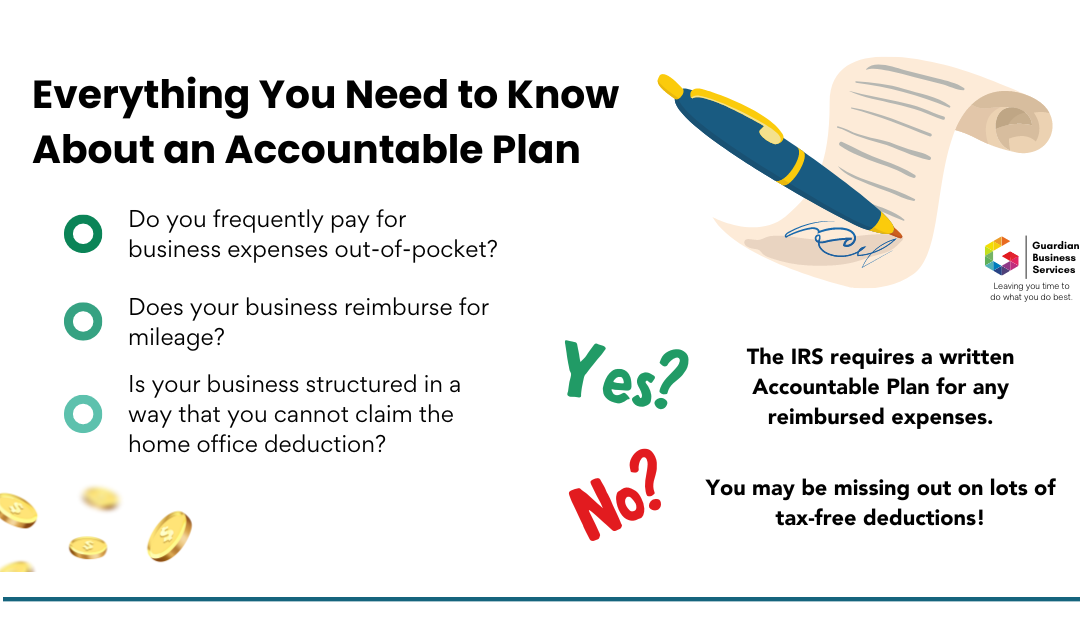Do you frequently pay for business expenses out-of-pocket? Does your business reimburse for mileage? Is your business structured in a way that you can’t claim the home office deduction? If either of these situations applies to you, it might be time to consider creating an Accountable Plan. In this article, we’ll cover everything you need to know about Accountable Plans, as well as help you get started with our free template.

What is an Accountable Plan?
An Accountable Plan is a document that outlines how reimbursements for business expenses are handled. This document will include qualifying expenses, the documentation needed, and the timeframe to complete reimbursements.
Accountable Plans provide tax-free reimbursement of certain business expenses paid out-of-pocket by you or your employees. As a result, the IRS requires business owners to maintain comprehensive documentation surrounding the details of the reimbursement. Failure to abide by these regulations could result in the reimbursement being taxable both personally and at the corporate level.
What Expenses Qualify for an Accountable Plan?
To qualify for reimbursement under an Accountable Plan, the cost must directly relate to business activities and be reasonable. For example, airfare related to a personal vacation wouldn’t qualify, but airfare to an industry convention or educational event would. There must be some underlying connection to your business activity. Here are some common qualifying expenses:
- Home Office Expenses (internet, office supplies, computers, etc.)
- Travel Expenses (meals, airfare, lodging, rental cars, etc.)
- Car Expenses (gas, repairs, mileage, etc.)
- Supplies (closing gifts, printer paper, pens, etc.)
- Dues and Subscriptions (license renewal fees, software, etc.)
- Phone Expenses
Any type of cost that is directly related to running your business can qualify for reimbursement under an Accountable Plan.

IRS Accountable Plan Requirements
Accountable Plans are regulated by the IRS as a fringe benefit. To prevent reimbursements for unrelated expenses, the IRS has established three main guidelines that Accountable Plans must meet:
- Business Purpose – The cost must be related to the purpose of the business. This means that you must have incurred the expense when performing duties for the business, like meeting with clients. Lunch with a personal friend can’t be properly substantiated if there is no underlying business connection.
- Substantiation – The cost must be substantiated with proper documentation. This includes receipts and invoices that outline the purpose of the expense, the cost, and the date. Expenses cannot be reimbursed without adequate support.
- Return Excess – Any reimbursements received in excess of the actual cost of the expense must be returned promptly. The IRS generally defines reasonable as 120 days from the payment date.
Although the IRS does not outline the timeframe for submitting expenses for reimbursement, sooner is better than later. This means you should not be submitting expenses from nine months ago. Instead, a timeframe of 30-60 days works best for most business owners. Your Accountable Plan documents should clearly state when expenses must be submitted and paid.
Accountable Plan Documentation
The right documentation is a critical component of maintaining a successful and compliant Accountable Plan. Here’s what your Accountable Plan should include:
- List of qualifying reimbursable expenses.
- Timeframe you and your employees must submit a request for reimbursement.
- Maximum reimbursable limit for each expense.
- Guidance on how reimbursable expenses are calculated.
- Any monthly allowance limits for home office expenses, car expenses, or travel.
- The reimbursement process.
- How excess reimbursements are handled.
The good news about Accountable Plans is that they are relatively straightforward after you establish your initial document.
Accountable Plan Car Expenses
One of the largest expenses for realtors is car expenses. After all, you’re probably traveling dozens of miles each day between closings and showings. Accountable Plans do not allow employees to double dip on reimbursements. This means you cannot reimburse actual car expenses, like gas and mileage. It’s either one or the other.
For example, let’s say gas costs you about $50 per week and you drive an average of 100 miles. Using the standard mileage rate of $0.67 per mile in 2024, you would receive a reimbursement of $67. You are not allowed to be reimbursed for the $50 in gas as well. Your Accountable Plan should state if you are reimbursing actual expenses or using the mileage method.

The Home Office Deduction and Accountable Plans
The Home Office Deduction is available to Schedule C filers, which generally includes businesses set up as Sole Proprietorships or Single-Member LLCs. It allows you to deduct qualifying expenses like internet, rent, and other supplies.
However, this deduction isn’t available to businesses structured as a Multi-Member LLC, Partnership, S Corporation, or C Corporation. By establishing an Accountable Plan, you are able to reimburse yourself or your employees for expenses normally claimed using the Home Office Deduction.
It’s important to note that you can’t double dip by claiming the Home Office Deduction and receiving reimbursement for expenses under an Accountable Plan. Consulting with a tax advisor is the best way to determine which route is best for your situation.
Summary
Does it sound like your business needs an Accountable Plan? It can allow you to enjoy tax-free reimbursements for expenses you may already be paying. Creating one from scratch can feel overwhelming, which is why we’ve done the work for you! Click on the button below to download your free sample. If you have questions, feel free to reach out for personalized help.

